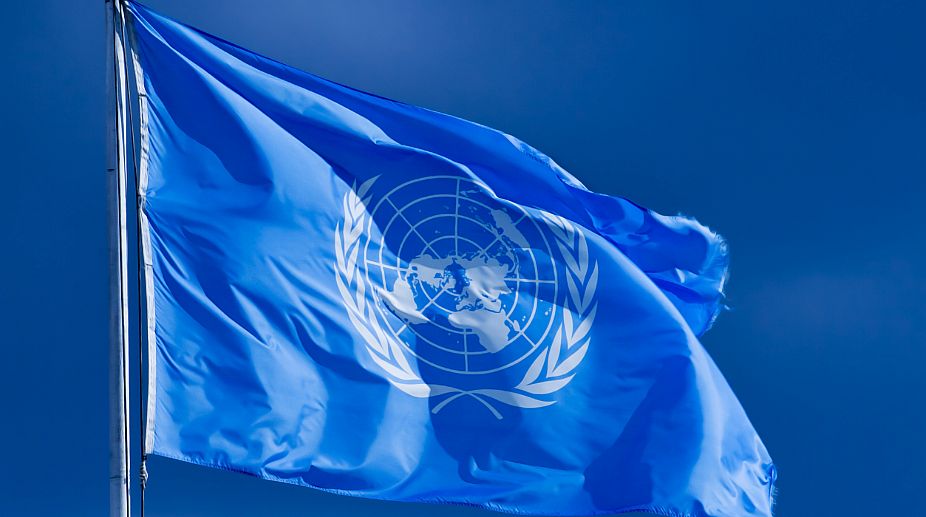Cong defeated ‘Bangladesh’ in semis, will rout ‘Pakistan’ in finals: Reddy
Reddy was addressing a meeting of the Congress social media team and took digs at both the BJP and the BRS.
Qureshi alleged that the mass murder of more than 150 children in the Peshawar school, the Mastung attack had ”links with terrorists supported by India.”

(PHOTO: Getty Images)
India on Saturday strongly hit back at Pakistan for the “preposterous allegation” its Foreign Minister Shah Mehmood Qureshi made at the UN that terrorists behind the 2014 attack on a Peshawar school were “supported” by India, saying the “despicable insinuation” dishonours the memory of the children killed in the assault.
“The despicable insinuation made by the Foreign Minister of Pakistan (Shah Mahmood Qureshi) dishonors the memory of the innocent lives lost to terrorists that day,” Eenam Gambhir, an Indian diplomat, told the General Assembly denouncing Qureshi’s claim that India was behind the attack that was carried out by the Pakistan Taliban.
“It is a desperate attempt to look away from the monster of terror that Pakistan itself has created in its quest to destabilise neighbours and covet their territory,” she said while exercising the right of reply to his speech.
Advertisement
“Let me recollect for the new government of Pakistan the outpouring of sorrow and pain in India that followed the massacre of innocent children in 2014.
She said both Houses of India’s Parliament had expressed solidarity while paying respects to those killed.
“Both houses of India’s Parliament had expressed solidarity while paying respect to the memory of those killed (and) schools all over India had observed two minutes of silence in their memory,” the counsellor in India’s UN mission said.
Qureshi had said that Pakistan will never forget the mass murder of more than 150 children in the Peshawar school, the Mastung attack and many others that “have links with terrorists supported by India.”
The Peshawar attack was carried out by heavily-armed 8-10 Taliban suicide bombers who stormed the army-run school and took several hostages. The attackers wearing paramilitary Frontier Corps uniforms had entered the school and started indiscriminate firing.
Qureshi spoke at the General Assembly after India’s External Affairs Minister Sushma Swaraj had delivered a scathing attack on Islamabad for promoting terrorism in the region and warning the world of a conflagration if it did not act against the sponsors and protectors of terrorists.
He tried to portray Pakistan as a victim of terrorism and made the claim about the Peshawar incident.
He also dragged in Kulbhushan Jadhav, an Indian that Pakistan’s military courts have in violation of accepted legal norms sentenced to death on spying charges.
Replying to Qureshi’s charges, Gambhir also took a dig at Qureshi’s emphasis on a “new Pakistan” under Khan, saying while the Indian delegation had come to listen to Pakistan’s “new” foreign minister outline the vision of a new Pakistan, “what we heard is a ‘New Pakistan’ cast in the mold of old.”
Gambhir tore into Pakistan’s claim that it has turned the tide against terrorism, saying a fact-check of this claim will give a different picture.
She asked if Pakistan can deny the fact that it is the “host and patron” of 132 of the UN-designated terrorists and 22 terrorist entities listed under the UN Security Council Sanctions regimes.
“Will Pakistan deny that the UN-designated terrorist Hafiz Saeed enjoys a free run inside Pakistan and spews venom and sets up candidates for electoral offices,” she said.
With Qureshi again raking up the Kashmir issue, Gambhir asserted that India is making it clear to the “new government” of Pakistan that the entire state of Jammu and Kashmir is and will remain an integral part of India.
India also ripped through efforts of the ‘New Pakistan’ to champion human rights.
“This is vintage verbal duplicity,” Gambhir said, citing the example of Princeton economic professor Atif Mian.
The economist was appointed and removed by Khan’s government from the Economic Advisory Council on the grounds that he belongs to a minority. Mian is an Ahmadi, a religious minority of Pakistan.
“Before preaching to the world, championing of human rights should begin at home,” Gambhir said.
She said a report by the Office of the UN High Commissioner for Human Rights on Kashmir, which Qureshi mentioned and welcomed in his speech, is a publication that no UN member-state had asked for or supported and on which no action was taken.
(With inputs from agencies)
Advertisement